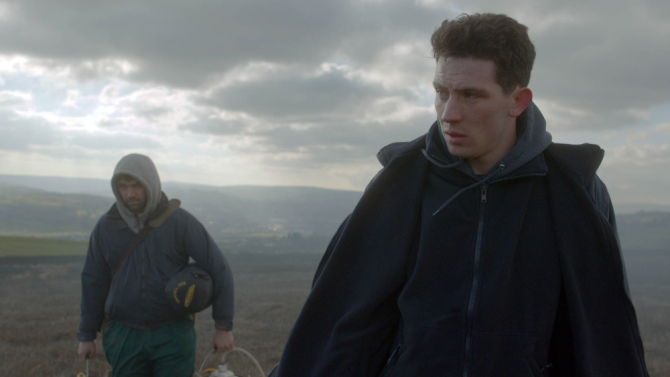Part of the Edinburgh International Film Festival
From first-time director Francis Lee, God’s Own Country is an unsentimental and refreshingly optimistic depiction of a gay relationship in a parochial rural community. In this case, the setting is the Yorkshire Pennines, where Johnny (Josh O’Connor) divides his time between working on the farm owned by his hard-faced father (Ian Hart) and drowning his sorrows in the local pub with the occasional sexual encounter. However, the arrival of Gheorghe (Alec Secareanu), a Romanian farm worker, results in an intense relationship between the two men that forces Johnny to question his life and future.
Lee, who also wrote the film’s screenplay, allows the relationship between Johnny and Gheorghe to unfold naturally, developing from Johnny’s initial animosity towards the Romanian immigrant, expressed by referring to him as a “gypsy”, to their initial rough embrace in the hills and concluding with Johnny pleading with Gheorghe to live with him on the farm. This sustained character development is helped by the engaging performances of the leading men. O’Connor effectively conveys Johnny’s frustration with his inert life, which he expresses by lashing out at his father, grandmother, and his old student friend; as well as his idealistic belief that he and Gheorghe can start a new life together and escape from his current stifling existence. Secareanu, in contrast, portrays Gheorghe with greater subtlety, reflecting the character’s more mature personality and perspective on life. This is demonstrated by his initial stoicism in comparison to Johnny’s bitter comments about life on the farm, and his more pragmatic fears that the farm could not survive if it were solely run by himself and Johnny.
Whilst critics have described God’s Own Country as a British Brokeback Mountain, most likely owing to the similarities in subject matter and themes of unrevealed love, Lee avoids repeating the main themes and conflicts of the earlier film. Most notably, there are no scenes showing the conflict between Johnny and Gheorghe’s relationship and his father and grandmother. Instead, Lee only acknowledges their possible disapproval with two wordless scenes, preferring instead to focus on the breakdown in Johnny and Gheorghe’s relationship as well as Johnny’s attempts to reunite with him and live out his dream. Lee also manages to avoid the downbeat conclusion of Brokeback, instead presenting a more hopeful alternative that feels consistent and realistic to the characters and setting, while simultaneously avoiding the potential trap of depicting gay relationships in working-class, non-metropolitan areas as doomed endeavours.
God’s Own Country is not only a well-made film that deserves to sit alongside the likes of Brokeback Mountain and My Beautiful Laundrette, it also shows that Lee has great potential as a director and is one to watch for the future.
